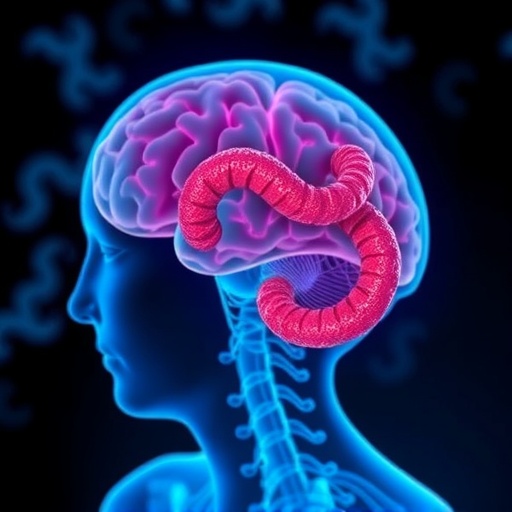Recent revelations in the field of myalgic encephalomyelitis (ME) have emerged, connecting genetic factors to two prominent symptoms: post-exertional malaise and cognitive dysfunction. Researchers Moezzi, Ushenkina, and Widgren, alongside their colleagues, have delved into the intricate world of haptoglobin phenotypes and their structural variants. The findings, detailed in their study published in the Journal of Translational Medicine, open new avenues for understanding this often-misunderstood condition that afflicts millions worldwide.
Myalgic encephalomyelitis, a complex disorder characterized by extreme fatigue, pain, and cognitive dysfunction, has long been a topic of debate in the medical community. Previously regarded as a psychological or purely fatigue-based illness, the cultural narrative surrounding ME is beginning to shift thanks to rigorous scientific inquiry. This new research underscores the biological foundations of the disease, specifically focusing on the role of haptoglobin, a protein involved in the body’s response to injury and inflammation.
Haptoglobin’s primary function is its ability to bind free hemoglobin in the bloodstream, thereby preventing kidney damage and iron loss following hemolysis. This protein exists in several phenotypes, which are genetic variations occurring due to differences in the Haptoglobin gene. Understanding these haptoglobin phenotypes is crucial, as they may play a significant role in how individuals with ME experience symptoms following physical exertion.
In their groundbreaking study, the authors investigated the relationship between haptoglobin phenotypes and the intensity of post-exertional malaise experienced by patients with ME. Post-exertional malaise is a defining feature of the disease, where even minor physical or mental activity can result in severe and debilitating symptoms. The researchers found that certain haptoglobin phenotypes correlated significantly with increased severity of post-exertional malaise, lending credence to the idea that genetic predispositions may influence how severely individuals react to exertion.
Moreover, cognitive dysfunction is another pillar of myalgic encephalomyelitis that affects daily functioning. The authors examined whether the structural variants of haptoglobin had any correlation with cognitive impairments noted among ME patients. The analysis revealed a striking association; individuals possessing certain haptoglobin variants displayed heightened cognitive dysfunction, impacting their ability to perform everyday tasks. For patients with ME, this added layer of complexity complicates the diagnosis and management of their condition.
The implications of these findings extend beyond mere academic interest. For patients suffering from ME and their caregivers, understanding that there are biological and potentially treatable roots underlying their distress can foster hope. Moreover, it bolsters the case for research funding and healthcare initiatives aimed at addressing this debilitating disorder. By shifting the discourse towards a more scientifically grounded understanding of ME, the stigma surrounding the illness may begin to dissipate.
In the broader context of precision medicine, the study of haptoglobin phenotypes and their functional consequences may pave the way for personalized treatment options for ME patients. If a specific haptoglobin phenotype is identified as detrimental, clinicians may develop targeted therapeutic regimens designed to mitigate the effects of physical exertion and cognitive stress. Such advancements would not only improve patient outcomes but could also enhance the quality of life for those affected by ME.
While the study’s findings are a promising leap forward, they also underscore the need for further investigation into the various genetic and environmental interactions that contribute to myalgic encephalomyelitis. Future studies could expand the genetic scope beyond haptoglobin to other inflammatory markers and pain pathways, which may reveal additional layers of complexity in ME pathophysiology.
As research continues to unfold, patients, physicians, and advocates alike must remain vigilant and engaged in the conversation surrounding this illness. The journey from understanding to treating myalgic encephalomyelitis has historically been fraught with obstacles, but rigorous scientific exploration offers a beacon of hope. The connections drawn between haptoglobin phenotypes and symptom severity could spark a renaissance in how this condition is viewed and managed.
In conclusion, the scientific inquiry into haptoglobin and its relationship to myalgic encephalomyelitis represents a pivotal moment in the understanding of this multifaceted disorder. The sheer complexity of ME reflects the intricacies of human biology, and as studies like the one authored by Moezzi, Ushenkina, and Widgren emerge, a new chapter of comprehension, compassion, and treatment may be on the horizon. For patients suffering with this illness, each scientific breakthrough offers a fragment of hope that the fog of confusion surrounding their condition might one day lift.
Going forward, it is crucial that the medical community, researchers, and stakeholders rally together, not just to increase awareness, but to stimulate further research initiatives focused on the underlying mechanisms of ME. As these efforts gain momentum, the intersection of genetics, immunology, and symptomatology may yield innovative therapeutic avenues, ultimately empowering patients on their road to recovery.
As we marvel at the advances in our understanding of myalgic encephalomyelitis, the collective resolve to foster scientific exploration and patient advocacy remains more critical than ever. The findings from the current study on haptoglobin are merely the tip of the iceberg, and the global scientific community is urged to delve deeper into the genetic factors that may be contributing to this complex illness. There is much work to be done, but for the first time, patients might have the opportunity to see their suffering recognized through the lens of scientific inquiry and, hopefully, validated with effective treatments.
Subject of Research: Haptoglobin phenotypes and their association with symptoms of myalgic encephalomyelitis.
Article Title: Haptoglobin phenotypes and structural variants associate with post-exertional malaise and cognitive dysfunction in myalgic encephalomyelitis.
Article References:
Moezzi, A., Ushenkina, A., Widgren, A. et al. Haptoglobin phenotypes and structural variants associate with post-exertional malaise and cognitive dysfunction in myalgic encephalomyelitis.
J Transl Med 23, 970 (2025). https://doi.org/10.1186/s12967-025-07006-z
Image Credits: AI Generated
DOI: 10.1186/s12967-025-07006-z
Keywords: Myalgic Encephalomyelitis, Haptoglobin, Post-Exertional Malaise, Cognitive Dysfunction, Genetics.




